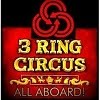Supervisory Procedures
Title: Fitness for Duty SOP 584
Date: Approved 11/6/2008 Page 1 of 3
1.0 Purpose:
This procedure outlines how supervisory personnel assess operators for fitness for duty on
a daily basis.
Fitness for duty is generally defined as an employee’s ability to perform the functions of his
or her job unhindered by any physical, mental or emotional conditions. It is critical for
operators who are responsible for the safety of significant numbers of customers, the
general public, and the District’s equipment and assets to be fit and fully attentive at all
times while on duty.
2.0 Procedures:
Operations managers, OCC personnel, field supervisors, station agents:
1. Operations managers, OCC personnel, field supervisors, and station agents shall be
trained, qualified and responsible for conducting and documenting fit for duty tests. All
personnel responsible for conducting fit for duty tests must attend a class on
“reasonable suspicion drug testing”.
2. Station agents or other qualified supervisory personnel shall ensure that every operator
reporting for duty at Ruby Junction or Elmonica is checked for fitness for duty before
being allowed to operate. If a station agent is not available to conduct a fit for duty
check, a field supervisor or other qualified supervisory personnel shall conduct the test.
If an operator begins service without a fit for duty test, the station agent or other
qualified supervisory personnel shall immediately contact Control to arrange for a
supervisor to meet the operator in the field and perform the required fit for duty check.
3. Field supervisors shall conduct and document fit for duty tests of operators who report
for duty in the field at locations within their districts. These checks shall be on a random
basis as defined by Field Operations manager(s).
4. A field supervisor shall check any operator involved in an incident that results in contact
between their vehicle and any other vehicle, person, bicyclist, or fixed object for fitness
for duty as soon as possible following the incident. This test shall be conducted and
documented even if a FTA post-collision drug and alcohol test is warranted.
5. A field supervisor shall check any operator who violates a safety-critical operating rule
for fitness as soon as possible following the incident. Control shall inform the supervisor
of the specific reason for the test. The supervisor shall document these essential
elements:
• Date, time, location and the event that prompted the test.
• Extenuating or mitigating conditions.
• The Operator’s explanation of the event.
• His or her clarification and/or re-instruction to the Operator.
• His or her assessment of the Operator’s fitness for continued duty.
Fitness for Duty – SOP 584
Page 2 of 3
6. To conduct a fit for duty test, the tester shall engage the operator in a brief discussion.
Typically, the subject of discussion will be the operating conditions and events the operator
may meet during his/her shift. The intent is for the operator to be fully included and
prepared for the conditions he or she may meet in service.
7. The tester shall observe the operator's attentiveness and behavior during the discussion to
determine if there is any condition that indicates that the operator may not be sufficiently fit
and prepared for service. Things to observe and consider include the following:
• Does the operator appear ill?
• Does the operator appear sleepy or overly fatigued?
• Does the operator appear overly stressed or emotional?
• Does the operator appear physically impaired in any way?
• Is the operator taking any medications?
• Is there any evidence or behavior that may indicate that the operator may be under the
influence of alcohol or a controlled substance? Observable effects of controlled
substances and/or alcohol use include:
o Staggering
o Slurred speech
o Odor of alcoholic beverage (beer, wine, whiskey, etc.)
o Shaky hands
o Decreased hand and eye coordination
o Reddening of the eyes
o Rambling or excited speech patterns
o Euphoria or laughing out of context
o Talkativeness, restlessness
o Sniffling or runny nose
o Fast mood swings
o Any unexplained change in personality over a period of time
o Any other extraordinary behavior
SEE: “Reasonable Suspicion Checklist” for full list of symptoms that may be
observable effects of controlled substances and/or alcohol use.
8. If the tester believes that an operator is not fit for duty, he/she shall immediately remove the
operator from service. The appropriate manager, based on consultation with the tester
observing the employee behavior, must make the final approval to remove the employee
from service. The reason for the removal shall be documented and forwarded to Field
Operations managers and the appropriate Transportation managers.
9. If the tester suspects that an operator’s fitness for duty has been compromised by the use
of alcohol or drugs or the reason for being unfit is not readily apparent, the tester shall
instruct OCC to contact a properly trained lead and/or manager to authorize a "Reasonable
Suspicion" drug/alcohol test. The appropriate manager must make the final decision to
conduct a drug/alcohol test in this case.
10. If the removal from service will be more than a temporary “breather,” such as might be
advisable after a stressful incident, or the employee conducting the test believes the
condition warrants further investigation; the Transportation Manager shall place the
operator on Administrative Leave, pending the outcome of the investigation.
11. All fit for duty checks must be documented using the prescribed forms. If an operator is
removed from service as a result of a fit for duty check, all documentation regarding the
incident must be submitted to a lead for distribution to Field Operations managers and the
appropriate Transportation managers. All other fit for duty forms shall be submitted to the
Operations Control Center for preservation.

No comments:
Post a Comment